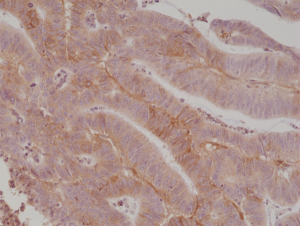anti-CD276 (human) Rabbit Monoclonal (RM335)
| Code | Size | Price |
|---|
| REV-31-1223-00-R100 | 100 ul | £455.00 |
Quantity:
Prices exclude any Taxes / VAT
Overview
Antibody Isotype: Rabbit IgG
Antibody Clonality: Recombinant Antibody
Antibody Clone: RM335
Regulatory Status: RUO
Target Species: Human
Applications:
- Immunohistochemistry (IHC)
- Western Blot (WB)
Shipping:
Blue Ice
Storage:
+4°C
Images
Documents
Further Information
Alternate Names/Synonyms:
B7-H3; B7 Homolog 3
Concentration:
N/A
EClass:
32160000
Form (Short):
liquid
Formulation:
Liquid. 50% Glycerol/PBS with 1% BSA and 0.09% sodium azide.
Handling Advice:
Avoid freeze/thaw cycles.
Immunogen:
A peptide corresponding to the C-terminus of human CD276 (B7-H3).
Long Description:
Recombinant Antibody. This antibody reacts to the cytoplasmic domain of human CD276 (B7-H3). Applications: WB, IHC. Source: Rabbit. Liquid. 50% Glycerol/PBS with 1% BSA and 0.09% sodium azide. CD276 (B7-H3) is a member of the B7/CD28 superfamily of costimulatory molecules serving as an accessory modulator of T cell response. B7 family molecules, which are expressed on antigen-presenting cells and display extracellular regions containing immunoglobulin (Ig) variable (V)- and constant (C)-like domains, are known to modulate T cell receptor (TCR)-mediated T cell activation by providing co-signals that are either stimulatory or inhibitory. B7-H3 provides a stimulatory signal to T cells. However, recent studies suggest a negative regulatory role for B7-H3 in T cell responses. B7-H3 inhibited T cell proliferation mediated by antibody to T cell receptor or allogeneic antigen-presenting cells. B7-H3 is a negative regulator that preferentially affects T(H)1 responses. B7-H3 may play an important role in muscle-immune interactions, providing further evidence of the active role of muscle cells in local immunoregulatory processes. Recently, B7-H3 expression has also been found in a variety of different human cancers, including prostate cancer, clear cell renal cell carcinoma (ccRCC), non-small-cell lung cancer (NSCLC), pancreatic cancer, gastric cancer, ovarian cancer, colorectal cancer (CRC) and urothelial cell carcinoma. B7-H3 was expressed in some human cancers and correlated with poor outcome of cancer patients.
NCBI, Uniprot Number:
Q5ZPR3
Package Type:
Vial
Product Description:
CD276 (B7-H3) is a member of the B7/CD28 superfamily of costimulatory molecules serving as an accessory modulator of T cell response. B7 family molecules, which are expressed on antigen-presenting cells and display extracellular regions containing immunoglobulin (Ig) variable (V)- and constant (C)-like domains, are known to modulate T cell receptor (TCR)-mediated T cell activation by providing co-signals that are either stimulatory or inhibitory. B7-H3 provides a stimulatory signal to T cells. However, recent studies suggest a negative regulatory role for B7-H3 in T cell responses. B7-H3 inhibited T cell proliferation mediated by antibody to T cell receptor or allogeneic antigen-presenting cells. B7-H3 is a negative regulator that preferentially affects T(H)1 responses. B7-H3 may play an important role in muscle-immune interactions, providing further evidence of the active role of muscle cells in local immunoregulatory processes. Recently, B7-H3 expression has also been found in a variety of different human cancers, including prostate cancer, clear cell renal cell carcinoma (ccRCC), non-small-cell lung cancer (NSCLC), pancreatic cancer, gastric cancer, ovarian cancer, colorectal cancer (CRC) and urothelial cell carcinoma. B7-H3 was expressed in some human cancers and correlated with poor outcome of cancer patients.
Purity:
Protein A purified.
Source / Host:
Rabbit
Specificity:
This antibody reacts to the cytoplasmic domain of human CD276 (B7-H3).
Transportation:
Non-hazardous
UNSPSC Category:
Primary Antibodies
UNSPSC Number:
12352203
Use & Stability:
Stable for at least 1 year after receipt when stored at -20°C.



